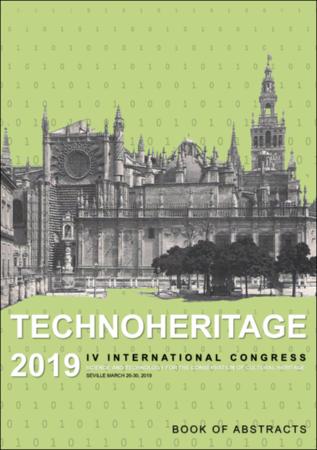
.jpg)
REPOSITORIO DE ACTIVOS DIGITALES
Depósito de documentos digitales reúne, difunde y preserva la documentación generada en los proyectos y actividades del Instituto Andaluz del Patrimonio Histórico.
https://hdl.handle.net/11532/328858
| Campo DC | Valor | Lengua/Idioma |
|---|---|---|
| dc.contributor.author | Navas-Carrillo, Daniel | es_ES |
| dc.contributor.author | Del Espino Hidalgo, Blanca | - |
| dc.contributor.author | Rodríguez Lora, Juan Andrés | - |
| dc.contributor.author | Pérez Cano, María Teresa | - |
| dc.contributor.editor | Francisco Pinto Puerto | es_ES |
| dc.date.accessioned | 2019-09-19T07:06:23Z | - |
| dc.date.available | 2019-09-19T07:06:23Z | - |
| dc.date.issued | 2019 | - |
| dc.identifier.isbn | 978-84-472-1868-4 | es_ES |
| dc.identifier.uri | https://hdl.handle.net/11532/328858 | - |
| dc.description.abstract | The study focuses on medium-sized cities, a system of urban settlements which dates back to more than two thousand years. Specifically, the case study is defined in Andalusia, the most populous and the second largest region in Spain, considering the Valley of Guadalquivir River as a geographical framework. In particular, the Andalusian urban system is substantially characterized by the historic importance of this type of cities within its territorial organization. Its relevance has been shown by historical cartography both at national and international scales. Twenty-six out of these cities have been declared as cultural heritage sites due to their spatial and landscape configuration, as well as to the relevant examples of civil, military or religious architecture they hold. However, the conservation of these assets be conditioned by a high exposure to certain risks and uncertainties, in relation to socio-demographic, socioeconomic or residential aspects. In this sense, these cities may be affected by certain fragile urban conditions which, when applied to a social space, may put at risk the transmission of historical urban fabric to future generations. Particularly, the project proposes to adopt the methodology implemented by the Ministry of Development in the Atlas of Urban Vulnerability to detect conditions of the social and structural disadvantage of the population of the abovementioned cities for effective cultural heritage tutelage. The current territorial discourse defends a polycentric model, in which the system of medium-sized cities is being strengthened, as their scale makes them a priori more humane and accessible in comparison to large ones. However, the study shows that most medium-sized cities have high rates of economic vulnerability probably caused by their traditional characterization as agrarian cities. In this sense, it is particularly interesting to analyze the response of these cities compared to their regional centres. For this purpose, the information from the 2011 Population and Housing Census provided by the Spanish National Statistics Institute (INE) have been objectively analyzed through fifteen urban indicators. These data have been clearly addressed by means of geographic information systems (GIS). We believe that a process to systematically analyze the vulnerability of these historical cities could help public administrations to develop specific policies to solve those detected weaknesses. Therefore, acting in reducing the urban vulnerability would result in a better and more efficient organizational capacity as a collective to manage the conservation of the cultural heritage of our cities. | es_ES |
| dc.format | application/pdf | es_ES |
| dc.language.iso | eng | es_ES |
| dc.rights | © Instituto Andaluz del Patrimonio Histórico | es_ES |
| dc.rights.uri | https://creativecommons.org/licenses/by-sa/4.0/deed.es | es_ES |
| dc.source | Technoheritage. "Science and tecnology for the conservation of cultural heritage" (4º. 2019. Sevilla), p. 53 | es_ES |
| dc.subject | Ciudades | es_ES |
| dc.subject | Territorio | es_ES |
| dc.title | Heritage conservation and urban vulnerability : the system of medium-sized cities of Baetica's inner territory | es_ES |
| dc.type | info:eu-repo/semantics/conferenceObject | es_ES |
| dc.coverage.placename | Bética | es_ES |
| dc.coverage.placename | Andalucía | es_ES |
| iaph.disponibilidad.externo | Consulta, reproducción, uso público | es_ES |
| iaph.disponibilidad.interno | Consulta, reproducción, uso público | es_ES |
| Aparece en las colecciones: | Jornadas/Congresos | |
| Fichero | Descripción | Tamaño | Formato | |
|---|---|---|---|---|
| 10_technoheritage_vulnerability.pdf | 1,53 MB | Adobe PDF |  Ver |
Los ítems de IAPH están protegidos por copyright, con todos los derechos reservados, a menos que se indique lo contrario.
Exportar registro
Ítems relacionados
Pérez Cano, María Teresa; Navas-Carrillo, Daniel; Navarro de Pablos, Francisco Javier; Del Espino Hidalgo, Blanca; Rodríguez Lora, Juan Andrés
Navarro de Pablos, Francisco Javier; Mosquera Pérez, Clara; Navas-Carrillo, Daniel; Del Espino Hidalgo, Blanca; Pérez Cano, María Teresa
Navas-Carrillo, Daniel; Del Espino Hidalgo, Blanca; Navarro de Pablos, Francisco Javier; Pérez Cano, María Teresa
Pérez Cano, María Teresa; Del Espino Hidalgo, Blanca; Navas-Carrillo, Daniel
Pérez Cano, María Teresa; Aladro Prieto, José Manuel; Del Espino Hidalgo, Blanca; Navas-Carrillo, Daniel








